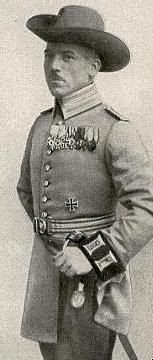Hermann Detzner
From Kaiserreich
MaskedPickle (Talk | contribs) |
MaskedPickle (Talk | contribs) m |
||
| Line 3: | Line 3: | ||
|} | |} | ||
| - | '''Hermann Philipp Detzner''' (born in Speyer, [[Germany]] on October, 16 1892) is a German military officer, writer and colonial administrator. He currently serves as '''Commander-in-Chief of the Ground [[ | + | '''Hermann Philipp Detzner''' (born in Speyer, [[Germany]] on October, 16 1892) is a German military officer, writer and colonial administrator. He currently serves as '''Commander-in-Chief of the Ground [[Mittelafrika|Schutztruppe]]'''. |
==Biography== | ==Biography== | ||
Current revision as of 18:59, 20 November 2008

|
Hermann Philipp Detzner (born in Speyer, Germany on October, 16 1892) is a German military officer, writer and colonial administrator. He currently serves as Commander-in-Chief of the Ground Schutztruppe.
Biography
Weltkrieg
Detzner had participated to the British-German expedition to Kamerun from 1907 to 1909 and again from 1912 to 1913. In 1914, as the illegal gold exploitation from British New Guinea to the German part to the island was becoming a great concern, Detzner received the mission to delimitate the border between the two parts of the island. As a lieutenant, he had began his mission on January when the Weltkrieg broke out. German New Guinea was quickly overwhelmed by the Australian forces, and surrendered on September, 21 1914. Detzner refused to surrender, and decided to hide in the jungle with twenty policemen, in order to continue the fight.
For seven years Detzner roamed all over the eastern part of New Guinea, flying the Imperial German flag as high as he could and generally making his point known. He made contact with scattered German colonists and Lutheran missionaries who supplied him with food, books and medicine. The small force fluctuated in size as he recruited fresh native policemen but then lost men to malaria and desertion. Three times during the war Detzner tried to make for the neutral Dutch East Indies but was thwarted by the impassable Hagen Mountains. Australian troops were in occupation of the coastline and large settlements of the colony and knew of Detzner’s band but never made contact with it. On several occasions the small German band would come into a village on the coast only to find an Australian warship, the HMAS Una (itself the former German governor's yacht), sitting at anchor and rapidly have to make their escape back to the mountains. When he learnt the end of the war from a Lutheran missionnary, Detzner agreed to sent word to the Australian army that he awaiting rapatriation to Germany. After a small rest in Liverpool, he returned to Germany in 1922.
Fame
After his return to Germany, Detzner published his famous book Seven Years Among the Cannibals, where he detailed his war experiences, with a description of the fauna and flora of Africa and Oceania. Earning a great popularity, he received a medal from the Berlin Society for Geography. However, some of his accounts in the book were thrown into doubt by later German explorers: he later admitted that some stories in his book were pure invention, and withdrew from his writing career. He decided to return to military and colonial duty, and was received in Mittelafrika with the rank of colonel. He later received the Command of the Ground Forces.
